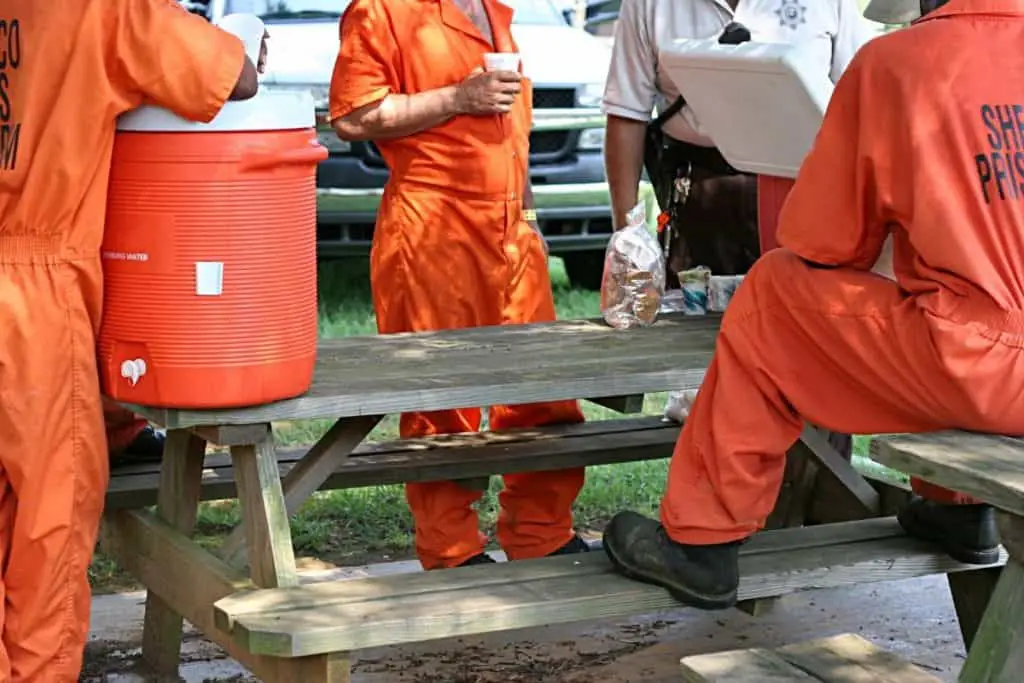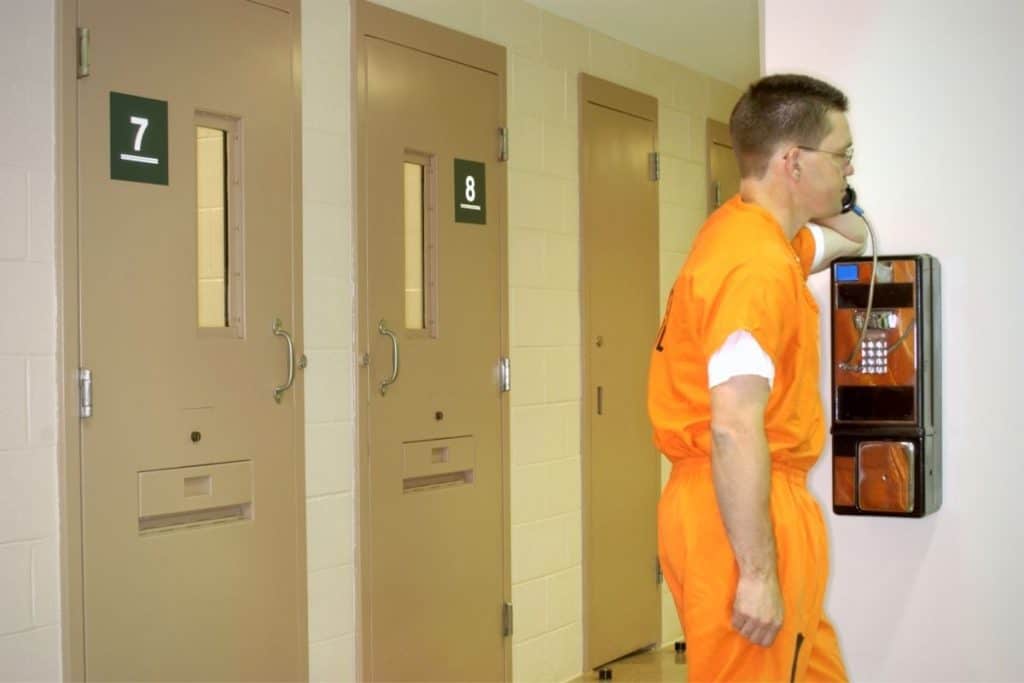Prisons and jails are some of the most heavily guarded and monitored places on the planet. Huge 12-14 ft high concrete walls topped with barbed wire, ground sensors, motion sensors, high tech cameras, and countless guards on patrol. Yet the black market in prison is thriving. Drugs, weapons, cell phones, tools, and various other electronics are smuggled into these facilities. If an inmate gets caught with drugs they face getting more time added on to their sentence and being sent to the box (solitary confinement) Many prisoners and their families are willing to risk it because there is big money in the black market behind bars.

How Do Prisoners Pay For Drugs?
Prisoners pay for drugs in one of two ways: inside currency or outside currency. Inside currency consists of things such as food from the commissary, tobacco, stamps, electronics (radios), magazines, and clothing. All of these items have value in jail and prison, especially tobacco and stamps. Outside currency is when actual money is being collected by someone on the street. Prisoners will have their family send a Western Union, Money gram, or money transfer on one of the various apps (Cashapp, Venmo, Paypal) to the dealer’s family. Once the money is collected the drugs are provided to the inmate. Inmates can also send money from their inmate account out to a person on the street.
I used every possible method of paying for drugs when I was incarcerated. My addiction didn’t stop when I got arrested, if anything it blossomed (not in a good sense) when I was in jail and then prison.
There Are Various Ways Inmates Can Get Money
- Money The Person Had On Them When They Were Arrested
- Money Earned Working At Jail or Prison Jobs
- Money Sent In By The Inmates Family or Friends
- Money Sent In By An Inmates Lawyers or Estate
Money On The Person When They Got Arrested
Most jails around the country will deposit whatever money a person has on them when they get arrested into their inmate account. This money can be used by the inmate for commissary unless they have fines and restitution to pay off in which case the state will take a portion of that money until the fine is paid off. When an inmate goes from jail to prison that money is transferred to their prison account.
Money Earned For Working In Prison
Many prisons including all the ones I was in, pay inmates when they work or attend required programs. This pay usually starts around 0.10¢ an hour and maxes out around 0.70¢ an hour. Pay varies depending on the state and also the job.

My first job in prison was to clean up the prison yard. This job paid me 0.12¢ per hour for roughly 16 hours a week. I would make about $3.84 every 2 weeks. That’s a small amount but it still allowed me to buy some extra food items on commissary. Around 6 months into my prison time I was able to get a better job unloading food and supply trucks that came into the prison. My starting pay at this job was 0.16¢ an hour and I worked up to 0.26¢ per hour. 0.26¢ an hour at 30 hours a week is only $7.80 each week, but that money adds up. Ramen noodles were 0.20¢ each so $7.80 a week wasn’t that bad.
Money Sent In By The Inmates Family or Friends
A prisoner’s family can send money to their inmate account anytime they want. In the past, they would send cash, checks, or money orders to the prison with the inmate’s name on them. Now they can do it online in a matter of seconds. This money usually shows up in the inmate’s account in a day or two and they can use it for commissary. If an inmate can make $5-$10 dollars a week at their prison job along with $50 a month from their family, that person can live pretty well in prison. $50 a month in most prisons can buy a lot of Raman noodles.
Money Sent In By The Inmates Lawyer or Estate
When I was in prison multiple guys had large sums of money on their inmate accounts. $40,000, $9,000 even $80,000. These prisoners received some type of settlement and the money was put on their inmate accounts at their request. One guy I was incarcerated with had his lawyer take $10,000 out of his 401K and put it on his account. This allowed him to have commissary money for the whole 5 years he was incarcerated.

How Do Inmates Pay For Drugs With The Money On Their Inmate Accounts?
The money a prisoner has in their account can be used for commissary items such as food, stamps, toiletries, or tobacco. All of these items have value in prison and are used as currency. They can be traded for drugs.
You may hear the term “on your books”. This refers to an inmate’s account. Guys will say “How much money you got on your books?”
Inmates are allowed to send money from their account out to “friends and family”. If I had $1000 in my account I could send my girlfriend $400 to help pay for bills. Inmates figured out they could send the dealer’s wife money and pay for the drugs that way. This is still one of the ways people pay for drugs in jail and prison but not as common as it used to be. The guards caught on and monitor the money being sent out of an inmate’s account.
Street – Street Money
Street to street money is becoming the most common way drugs are paid for in prison, specifically with larger amounts. If I bought a $5 joint when I was in prison I would pay for it with tobacco or stamps, but when buying $100 worth of something usually it was paid for by a personal cash transaction or Western Union (or any other money transfer services). CashApp, Venmo, Paypal, and other Apps are becoming very popular within the prison world as a form of payment.
If the dealer and buyer are both in the same city they may have their mutual family members meet and exchange the money. This can be risky especially if the people have never met.
Western Unions (westies) and the various money transfer apps are more common. Here’s a quick step by step of how this process actually works:

- The inmate buying the drugs will call his family to have them send money to whoever the dealer chooses
- The buyer gives his family the username or address of the recipient
- When the money is sent the buyers family will get some type of confirmation code (they can also make a password if they choose)
- The buyer goes to the dealer and tells him it’s all set and provides the confirmation number or password
- **If they have a good past relationship many times this is enough for the buyer to collect their drugs – the dealer is trusting that the proper amount was sent and the confirmation number is accurate**
- The dealer calls his girl/wife gives her the confirmation number and checks the app to see the money was received
- If all is well the dealer gives the user the drugs
All phone calls in jail and prison are subject to being monitored and recorded. Inmates will often use codes to get around this as well as the sheer number of calls going out of the facility makes it near impossible to listen to everything.
There were 50 prisoners and 4 phones in the main unit I was in. The majority of the day those phones were all being used. This specific prison (which was a small prison compared to most others in NY state) had 17 units. There were also phones out in the prison yard. That’s roughly 70 phones being used by over 1000 inmates. Keeping track of every word said on every call is near impossible.

The Ongoing Drug War – Behind Bars
The ongoing drug war is constantly evolving and thriving, both on the street and behind bars. Any jail or prison guard that’s been on the job for more than a week knows the basics of how the black market drug trade works in prison. These methods of smuggling drugs in prison and getting payments out are known by authorities yet they’re still thriving. This is one more testament to our failed war on drugs. We have treated drug addiction the same way for decades and expected different results.
Articles
A common question many people in recovery from drugs get asked is "Why can't you have a drink?" or "If alcohol wasn't your drug of choice why can't you drink?". Everyone has their own path in...
A person in active addiction will do things that cross their own moral boundaries. On the inside, they will feel guilty and ashamed of what they are doing but the pull of addiction and the crippling...


